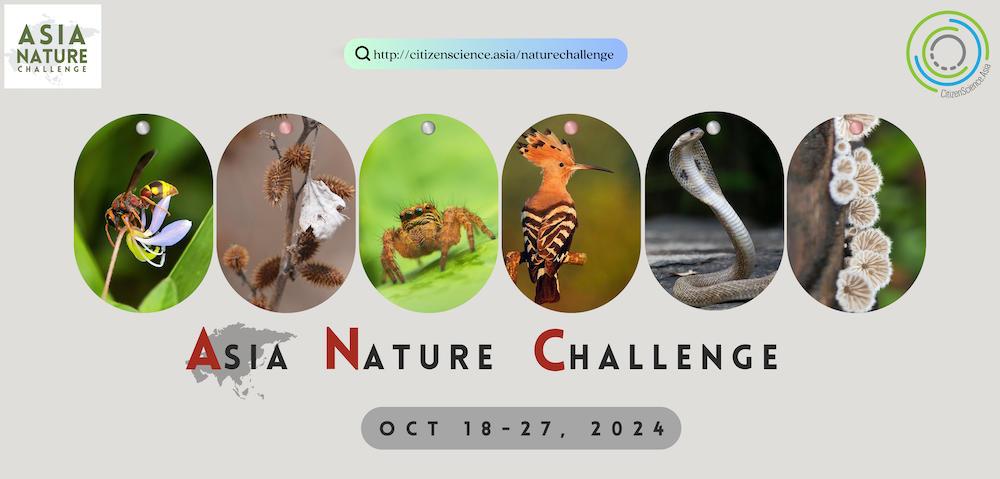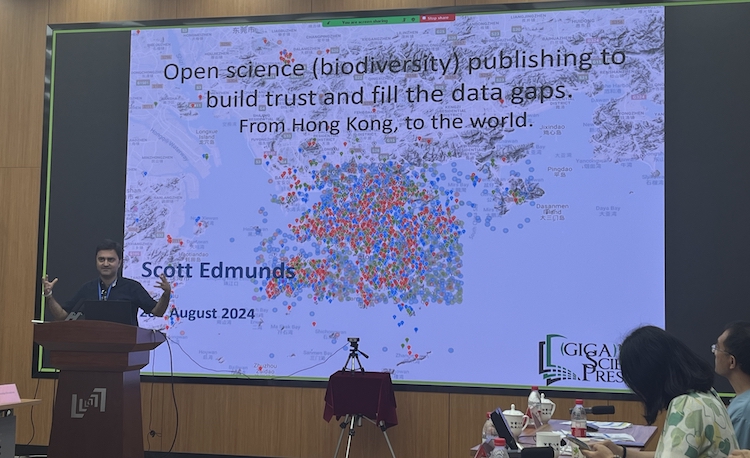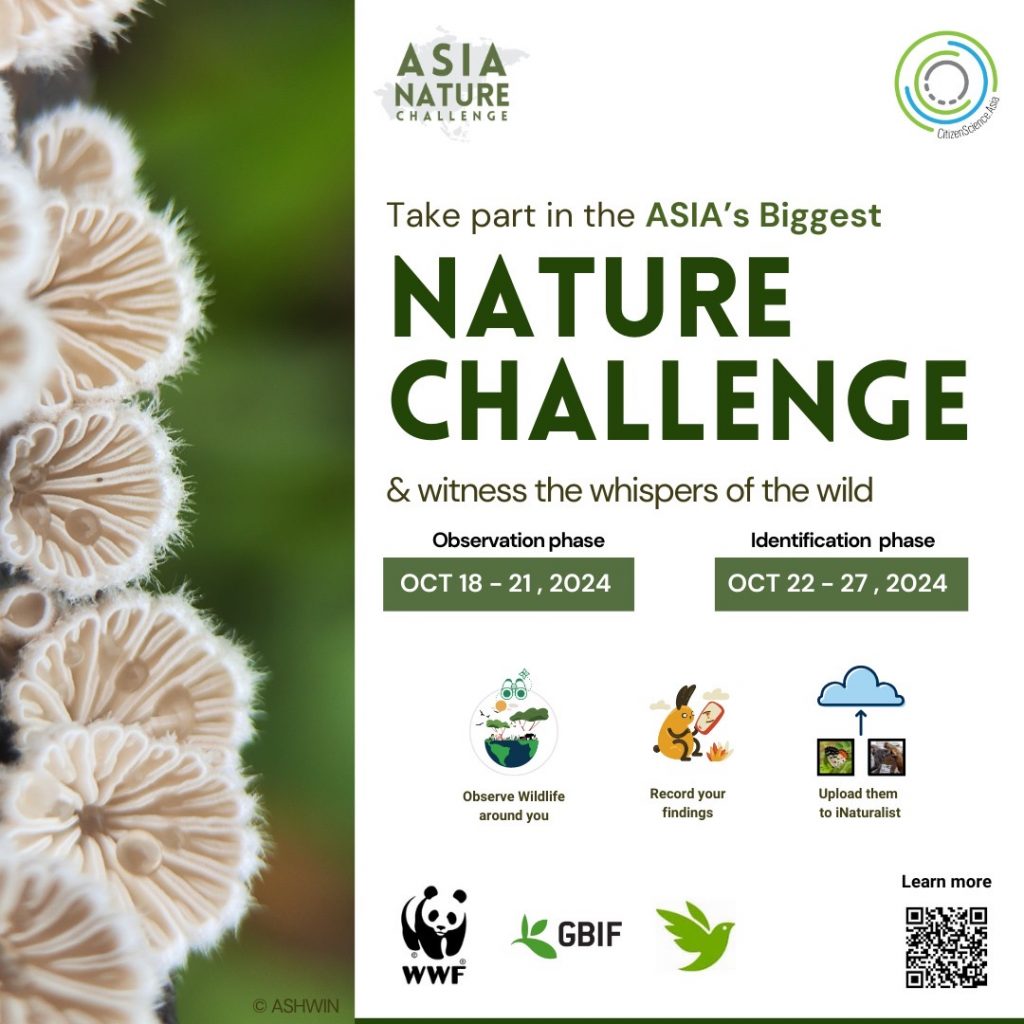Filling the Biodiversity Dark Spots: Announcing the Asia Nature Challenge

GigaScience Press is helping CitizenScience.Asia mobilise Citizen Scientists Across Asia for a groundbreaking biodiversity initiative from October 18 to 27 2024.
Regular readers will have seen our efforts to promote and amplify citizen science projects, citizen science being a key driver of “Open Engagement of Societal Actors”, which was highlighted by UNESCO as one of the four fundamental pillars of Open Science (and flagged in our 10th birthday Editorial as an area we needed to focus on for the next decade). Professional science alone cannot provide information at the scales and resolutions necessary to understand the challenges of environmental change, and problems with scientific data collection are hindering efforts to halt mass extinction and biodiversity loss. The GBIF (Global Biodiversity Framework) platform has become the go-to home for this type of data, recently crossing over 3 billion records. Because it is scalable Citizen Science has become GBIF’s biggest source of data, particularly citizen science-derived data from the massively popular smartphone app-driven eBird and iNaturalist projects. These provide large volumes of data to GBIF but there are known biases in data types and geography, with some species more popular than others, and some parts of the world having many more users. As Hong Kong based GBIF publishers in August we attended the GBIF Asia Nodes meeting in Beijing, and it was highlighted in a number of talks that data was underrepresented from what is the largest and most populous contentment.

Our Editor in Chief Scott Edmunds resenting at the GBIF Asia Nodes meeting in Beijing in August 2024.
We have done efforts to drive data sharing from under-represented taxa (see our GigaByte Data Release papers on the Hong Kong Jellyfish and iNaturalist projects on Brazilian fruit tree species), but there is a need to promote the filling in of geographic data gaps too.
With that in mind our friends at CitizenScience.Asia are proud to announce this week the launch of the Asia Nature Challenge (ANC), a continent-wide citizen science event designed to significantly enhance biodiversity data collection across Asia. This two-part event will bring together participants from across Asia to document the region’s diverse flora and fauna. Participants will be encouraged to get out and take observations of their surrounding environments between October 18-21, and then there will be a focus on teaming up with experts between October 22-27 to do identifications on the observations collected.
Asia, home to some of the world’s most unique ecosystems, ranks third among continents in biodiversity observations on iNaturalist. However, when measured by per capita observations, the region lags behind other continents. With a population of over 4.7 billion, Asia has immense potential for citizen science contributions. Statistics from July 2023 to June 2024 show that Asia accounts for a smaller share of biodiversity observations per million people, despite being home to critical ecosystems and species diversity. This lack of data is critical for such a biodiverse region off the world, and in a recent study looking at global biodiversity ‘dark spots’ where there are the most plant species waiting to be discovered, most of these were in Asia. With 22 of the 33 ‘dark spots’ highlighted as needing further research being in Asia, including the island of Sumatra, the eastern Himalayas, Assam in India, and Vietnam.
To address this disparity, the ANC aims to increase biodiversity records in Asia and encourage public involvement in nature conservation through citizen science. This initiative comes at a crucial time as more Asian nations recognize the importance of citizen contribution to conservation efforts. The ANC will also seek to boost involvement from areas that have been underrepresented in the past.
The Asia Nature Challenge will strengthen communities by promoting collaboration among environmental organisations, researchers, and citizen scientists. It will increase capacity towards biodiversity research through general public awareness and training. Furthermore, the initiative aims to expand on international conversations to ensure that Asia’s biodiversity receives the attention it deserves.
How to Participate
For both budding and veteran citizen scientists, participating is easy with a free account at iNaturalist. Visit inaturalist.org from your browser, or download iNaturalist app from the Apple App Store or Google Play Store to create your account.

Participants At Large:
Observation: October 18-21, 2024
- Find Biodiversity: Look for any plant, animal, or signs of life in your city / area.
- Take a Picture: Capture a photo of your discovery and make note of its location.
- Share Your Findings: Upload your observations to iNaturalist.
Identification: October 22-27, 2024
- Survey Observations: See which observations have not been identified in iNaturalist.
- Provide Identification or Categorisation: Suggest at minimal a high-level group like “plants,” “insects,” “birds,” or “fungi” for unidentified observations.
- Review Suggestions: Confirm or correct any identification suggestions already made.
Collaborating Organisations:
Through this event, interested organisations will also be invited to collaborate, coordinate, and lead local engagement efforts. CitizenScience.Asia will facilitate necessary resources, including training material and educational support, to ensure organisers and participants have a seamless experience. This initiative promises to be a pivotal moment for conservation efforts across Asia, generating valuable data that will support biodiversity management and policy-making for years to come.
If you are interested to participate as a collaborating organisation, member, or just as a citizen on the ground, please visit https://citizenscience.asia/naturechallenge.
Further details about the Asia Nature Challenge will be provided on the website, along with all necessary educational resources to ensure a successful local event.
References
Edmunds SC et al. A Decade of GigaScience: Milestones in Open Science. GigaScience. 2022;11:giac067. doi: 10.1093/gigascience/giac067.
Terenzini J et al. Jellyfish in Hong Kong: a citizen science dataset. GigaByte. 2024. https://doi.org/10.46471/gigabyte.125
Soares FM et al. Citizen science data on urban forageable plants: a case study in Brazil, Gigabyte, 2024 doi:10.46471/gigabyte.107
Ondo I et al. Plant diversity darkspots for global collection priorities. New Phytol. 2024 Aug 16. doi:10.1111/nph.20024.